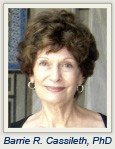During the 1960s and 1970s, the concept of a holistic approach to treating disease that took into account the body, mind, and spirit grew in patient popularity and morphed into two basic categories: alternative and complementary, which later became known by its acronym CAM (complementary and alternative medicine). However, because alternative therapy refers to unproven or disproven treatments that have no place in legitimate cancer care, integrative medicine experts, including Barrie R. Cassileth, PhD, Chief, Integrative Medicine Service at Memorial Sloan-Kettering Cancer Center in New York, say the terminology is misleading and confusing and needs to be abandoned. Even the term “integrative medicine” can be misleading, said Dr. Cassileth, who instead uses a more accurate term to describe the practice of integrative oncology: evidence-based complementary medicine.
“Evidence-based complementary medicine refers to interventions that are rational and that have been found useful as adjuncts for purposes of symptom control,” said Dr. Cassileth in an interview with The ASCO Post. “These therapies are not said to cure cancer. And they are not offered, promised, or sold as treatments to use instead of chemotherapy, radiation, or surgery. These therapies are meant to be used in combination with mainstream cancer treatment.”
Raising Awareness
By making the term evidence-based complementary medicine more commonplace, Dr. Cassileth is hoping to educate both medical professionals and patients about the helpful, appropriate complementary therapies that are available, and distinguish them from the all-too-available questionable approaches.
“If promoted techniques are found to be worthless or if they are patently absurd, such as homeopathy, they should be avoided. The medical world is in turmoil around these issues, and the public typically cannot tell the difference between viable interventions and quackery. I spend half my time studying whether complementary approaches relieve patients’ specific physical and emotional symptoms and the other half trying to get rid of quackery. It’s not an easy task,” said Dr. Cassileth. ■

 Barrie R. Cassileth, PhD, Chief, Integrative Medicine Service at Memorial Sloan-Kettering Cancer Center (MSKCC) in New York, recently spoke with The ASCO Post about her quest to stamp out the illegitimate use of alternative medicine in cancer care and the results from her latest research.
Barrie R. Cassileth, PhD, Chief, Integrative Medicine Service at Memorial Sloan-Kettering Cancer Center (MSKCC) in New York, recently spoke with The ASCO Post about her quest to stamp out the illegitimate use of alternative medicine in cancer care and the results from her latest research.